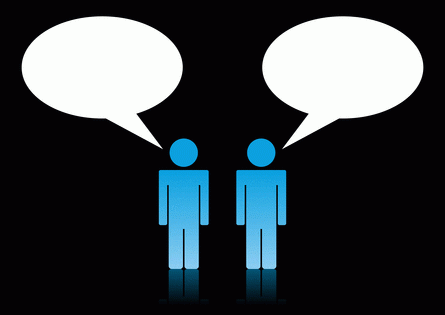Warning: this post is somewhat lengthy. I hope you can hold your attention for long enough and that it mostly makes sense.
A couple weekends ago, I met up with a friend for dinner and drinks to catch up I hadn’t seen in a while. Over the course of the evening, conversation ran the course of the normal “what’s new with you?”, “how’s the job?”, and “any new projects around the house?” These are all usually pretty safe topics for people to discuss, usually without the need to expose yourself to anything beyond the surface or that require much pause for thought before opening our mouths.
However, the bigger challenge facing our friendships and relationships with people relates to our ability to have real conversation. All too frequently our communication with one another, whether it be in person or online, deteriorates into meaningless chatter. The worst part of it is most of us don’t notice or simply don’t care that in the middle of all this noise, nobody’s really saying anything at all. If there is anything being said, how much of the content is only about yourself? How often do you find yourself asking your friends questions about anything?
Interactive and thoughtful discourse is lost on us. We turn our “conversations” with one another into a handful of categories, such as:
- Let me tell you about myself and I don’t really care what you think of it unless you like it/agree with it
- Let me tell you about what I heard on TV/read online
- Let me try to one-up you with my incredible wit and really funny insights into the world. Likely I’ll be posting these things on Facebook and Twitter, too. Please like everything I say and do on FB, BTW. Thx!
There is plenty of evidence to show our American culture has been pretty self-centered for a really long time and more anecdotal proof arrives by the truckload daily. What of social media’s place? Isn’t it supposed to connect us in ways we never imagined? I’m a fan of the services out there as much as the next guy, but take a step back and ask yourself “why do I share what I share online?” If we all admit it to ourselves, we all want some level of attention. Connecting with friends is a great cover letter for social networking’s initial purposes, but we all know there’s a little “look at me” component. And maybe a little bit of that is OK. Moderation in everything, right? At least that’s how the phrase goes.
I think part of the problem lies in the mediums we use to communicate. (This is where part of the conversation with my friend starts to come into play.) Our conversation turned to how infrequently our interactions with each other mentally stimulate us now. My friend “C” was telling me how he had this really engaging chat over a few hours about his friend’s business idea. When you come away from a conversation energized, you know you actually got your mind – and depending on the topic, maybe your heart – connected to what was going on. If we don’t feel anything, why are we wasting our time on it in the first place?
So C and I continued our chat and lamented a bit about the lack of genuineness in social network interactions like those on Facebook and Twitter. We debated possible reasons for this. For me, one of the primary drivers is that both platforms ultimately don’t allow the space for depth. This shouldn’t be a surprise on Twitter. Really, how deep can you get with 140 characters? And while Facebook’s platform gives you more characters for updates and that “personal” space to share with friends, your profile turns into quick sound bytes and quips about topics that rarely give much insight into who you truly are, especially when you have a larger and larger friend list that makes you feel like you’re yelling into an already overcrowded room. We’ve lost the ability to communicate quietly but with true depth and instead only know how to barely stand in the shallow end of the pool.
In a future post, I will continue to share my thoughts on conversational styles, discourse on topics, and more. Thanks for making it this far. Perhaps you’ll come back for Part 2.

Leave a Reply